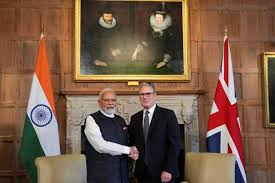India-UK CETA: Scotch whisky imports to get cheaper now with tariffs halved to 75%

India and the UK have signed the Comprehensive Economic and Trade Agreement (CETA), ending years of negotiation. A major highlight of this deal is the immediate reduction of import tariffs on Scotch whisky from 150% to 75%. This step is expected to reshape India’s premium liquor market, allowing consumers to buy popular Scotch brands at lower prices. It also opens doors for UK whisky makers to boost exports to one of their fastest-growing markets.
A Deal Years in the Making
The UK has long pushed for tariff cuts on whisky exports to India. For decades, high customs duties kept Scotch whisky out of reach for many consumers. The CETA finally breaks this barrier. Under the agreement, tariffs will drop further to 40% over the next 10 years.
Whisky brands like Johnnie Walker, Glenlivet, and Chivas Regal could now become far more affordable. The lower tariffs will encourage more premium and craft whisky brands from Scotland to enter India.
Price Impact on Consumers
Will whisky prices drop immediately? Experts say not entirely, because state taxes and excise duties remain unchanged. These state-level levies often account for 50–60% of the retail price.
Still, industry insiders expect prices to fall gradually. A bottle that currently costs ₹5,000–₹6,000 in cities like Delhi or Mumbai may soon cost ₹4,000 or less. Over time, the combination of tariff cuts and competition could push prices even lower.
A Boost for the UK Whisky Industry
For the UK, this trade deal is a big win. Scotch whisky is the UK’s biggest single food and drink export. India, with its growing middle class and rising disposable incomes, is a key market.
The Scotch Whisky Association predicts an additional £1 billion in exports over the next five years due to this agreement. UK Prime Minister Keir Starmer said the deal will create more jobs and support distilleries across Scotland.
Domestic Industry Concerns
The Indian spirits industry has raised concerns about the tariff cuts. Local producers fear losing market share to cheaper imported Scotch. Indian-made foreign liquor (IMFL) dominates the premium segment today. A price drop for Scotch could challenge this dominance.
The Confederation of Indian Alcoholic Beverage Companies (CIABC) criticized the absence of a Minimum Import Price (MIP). They argue that without an MIP, some Scotch brands could directly compete with domestic whiskies. This may force Indian producers to lower their prices or lose sales.
However, some Indian distillers see this as an opportunity. They plan to improve quality and focus on premium or craft segments to compete effectively.
Ratification and Timeline
The tariff cuts will not take effect immediately. Both countries must ratify the CETA in their parliaments. This process could take several months. Consumers might see lower prices only by late 2025 or early 2026.
Once approved, the phased tariff reduction will bring lasting changes to the market. More international brands are expected to enter India, increasing choice for consumers.
Beyond Whisky: Wider Trade Benefits
The CETA is not limited to Scotch whisky. It also covers trade in services, technology, and manufacturing. Bilateral trade between India and the UK currently stands at around £36 billion per year. This deal aims to push that figure much higher in the coming years.
Scotch whisky, however, has become the standout success story of this agreement. Its popularity in India and economic significance for the UK make it a clear symbol of stronger ties between the two nations.
The Future of India’s Premium Spirits Market
India’s premium spirits market is already growing at a steady pace. Rising urbanization, higher incomes, and changing consumer tastes have created a demand for high-quality liquor. The CETA will accelerate this trend.
As Scotch whisky becomes more affordable, consumers will gain access to a wider variety of global brands. This could also raise expectations for better quality among domestic producers.
Key Takeaways
- Tariffs cut in half: Import duty on Scotch whisky has dropped from 150% to 75%.
- Gradual reduction: Tariffs will fall further to 40% over 10 years.
- Retail prices: Consumers may see a 15–20% price drop initially.
- Domestic impact: Indian whisky brands will face stiffer competition from global players.
- Timeline: Price changes will start once both parliaments ratify the deal.
Conclusion
The India-UK CETA marks a historic shift in trade relations. For whisky lovers in India, this is welcome news. Lower tariffs will make premium Scotch more accessible and affordable. For the UK, it unlocks a market with enormous potential for growth.
Though challenges remain for Indian producers, the deal is likely to raise the overall standards of the industry. In the long run, both nations stand to benefit—India with better access to global products and the UK with stronger export revenues.






